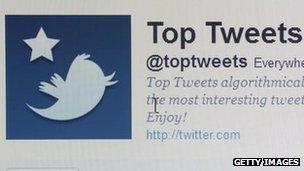Pakistan restores Twitter after block
- Published

Pakistani authorities have restored access to the social media website Twitter, hours after blocking it for messages deemed "offensive to Islam".
No clear reason was given for the ban, which came into force shortly after Interior Minister Rehman Malik said there were no plans to block Twitter.
Correspondents say it appeared to stem from tweets about a 2010 competition on Facebook to submit images of the Prophet Muhammad.
Islam forbids images of the prophet.
The Pakistan Telecommunications Authority (PTA) lifted the ban on Sunday, about eight hours after it came into force.
No reason was given for the about-turn.
'Futile'
The ministry of information technology had talked of "blasphemous and inflammatory content" on Twitter.
On Saturday, PTA chairman Mohammed Yaseen told the Associated Press (AP) on Saturday that Twitter was blocked after it refused to remove the material.
A few hours earlier, Mr Malik had tweeted : "Dear all, I assure u that Twitter and FB will continue in our country and it will not be blocked. Pl do not believe in rumors," it said.
US-based Human Rights Watch called the ban "ill-advised, counterproductive and futile".
Despite the ban, AP reported that many people in Pakistan had still been able to access Twitter by using software that disguises the user's location.
In 2010, Pakistan blocked access to about 1,000 websites because of the "Draw Prophet Muhammad Day" competition on Facebook.
That ban remained in place for about a fortnight until Facebook blocked access to the controversial page in Pakistan.
Over the past year thousands of websites have been blocked without warning in Pakistan. Pornographic sites have been targeted, as have sites that are considered "anti-state".
The BBC's World News channel was taken off air from November 2011 until March 2012 after it broadcast something the Pakistani establishment saw as objectionable.
But while there may be those worried about freedom of speech here, there have also been many who, in the past, have raised their voice in support of such restrictions on the media and internet, says the BBC's Aleem Maqbool in Islamabad.
- Published24 March 2012
- Published18 November 2011
- Published19 May 2010